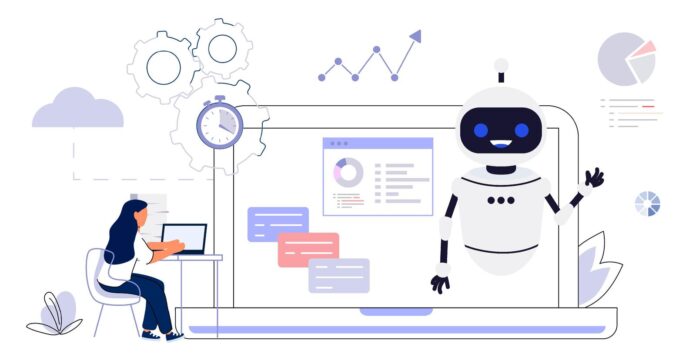Hyperautomation has already brought significant improvements to businesses, and it’s only getting better. Organizations are using hyperautomation to become more agile, efficient, and resilient. It enables them to streamline repetitive tasks and make real-time decisions.
In today’s fast-paced business world, every second counts, and falling behind competitors is not an option. The COVID-19 pandemic has only amplified the need for organizations to optimize their time and resources while continuing to increase their brand’s value. As a result, various technological tools have emerged in recent years, allowing businesses to automate processes that do not generate value but are necessary for their operations.
However, with the rapidly changing business landscape and increasing customer demands, organizations must implement automation technologies in more areas and processes. This is where hyperautomation comes in.
Hyperautomation is the concept of automating everything that can be automated in an organization by combining the right technologies to simplify, discover, design, measure, and manage workflows and processes across the enterprise. It is essential to note that hyperautomation does not seek to replace humans entirely. Instead, automation frees humans from repetitive, low-value tasks, allowing them to focus on activities that are vital to the organization’s growth. This collaboration between automation and human involvement helps organizations provide superior customer experiences, lower operating costs, and increase profitability.
Hyperautomation involves various technologies, including Robotic Process Automation (RPA), Business Process Management (BPM), Artificial Intelligence (AI), Machine Learning (ML), and advanced analytics. These technologies offer numerous benefits to companies and have become an essential part of their operations.
In this article, we will delve deeper into the hyperautomation trend and explore some of the top hyperautomation technologies and trends to watch out for in 2023. Whether you’re an IT professional or a business owner, understanding these trends can help you stay ahead of the curve and drive innovation in your organization.
Cognitive Automation
As hyperautomation continues to grow in popularity, one of the most significant trends to watch out for is cognitive automation. This technology uses machine learning to automate tasks that were previously performed by humans.Cognitive automation involves interpreting natural language, analyzing images, making decisions, and solving complex problems, among other tasks.
Cognitive automation allows algorithms and learning techniques to imitate human cognitive capacity, which leads to improved efficiency and decision-making when analyzing large amounts of data, identifying patterns and trends.
As the field of artificial intelligence continues to evolve, cognitive automation will become even more sophisticated, providing even more value to organizations that adopt it. This technology will allow businesses to become more agile, efficient, and responsive to the ever-changing market landscape, making them better equipped to meet their customers’ needs and stay ahead of the competition.
Intelligent Virtual Agents
Intelligent virtual agents are another trend that is set to transform hyperautomation in 2023. These agents use artificial intelligence, primarily natural language processing techniques, to answer questions and perform tasks on behalf of the user. The goal of an intelligent virtual agent is to provide a natural user experience by imitating human interaction. Until now, virtual assistants were primarily used to automate everyday tasks and provide relevant information. However, the objective of intelligent virtual agents is much broader, as they can help the user in any aspect, from writing and synthesizing documents to executing specific actions in transactional systems. These agents rely on large language models that are correctly trained and bounded, which ensures that they provide accurate and relevant information.
Process Mining
Process mining is a trend that has gained relevance in recent years, but in the last few months, many large organizations have opted to find the reality of their processes. They are taking advantage of powerful tools that have a great capacity for analyzing these processes.
The objective of process mining is to identify areas of improvement in an organization’s processes and enhance them. In a time of uncertainty, such as the one we are living in, processes are affected by multiple factors, both internal and external to the organization. Therefore, it is essential for companies to bet on technology to remain competitive at all levels. The objective is to transform into an “Intelligent Company” that is capable of adapting to changes and making informed decisions.
Citizen Developer
Do-It-Yourself or Citizen Developer is a trend that has gained relevance in recent months. With the maturity of no-code and low-code development platforms, organizations can establish a framework that allows their users to be autonomous in the development of their own applications. This reduces IT costs and provides the business with flexibility, autonomy, and agility. However, it is essential to establish a framework for work, governance, and control over these platforms to control the architecture, the risk, investment, and security. It will be key in the coming months for organizations to invest in citizen developers to ensure that they can respond quickly to changing business requirements.
Low-code apps
Low-code apps have become an increasingly popular trend in hyperautomation. In many organizations, there are still many processes that lack structure and are difficult to follow and monitor. This is where low-code development tools come in. They allow businesses to create applications quickly and easily, helping to structure these processes digitally and providing organizations with the ability to monitor them.
But the trend doesn’t stop there. There is a cross-market trend that is pushing organizations towards a no-code world. This trend involves giving the leadership of digital transformation to DigitalOps teams through the modeling and monitoring of their operations with systems that allow the creation of a complete Digital Twin of the organization. This way, businesses can manage and digitize the execution of tasks and processes of all kinds.
By creating a Digital Twin, businesses can gain a better understanding of their operations and optimize them for greater efficiency and effectiveness. This approach also allows organizations to be more agile and responsive to changes in the market landscape, giving them a competitive edge.


